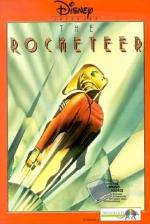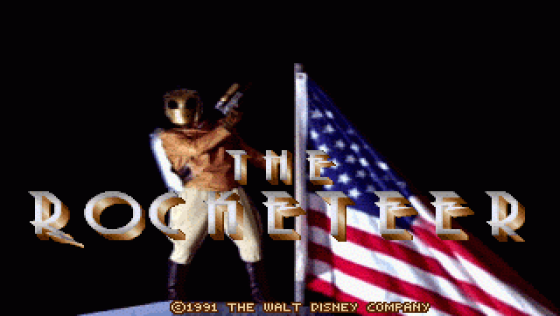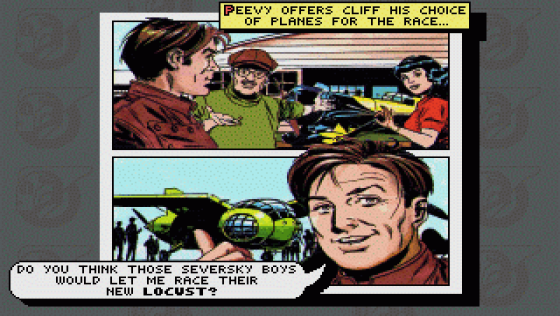
Future Publishing
 8th January 1992
8th January 1992
Published in Ace #054: March 1992
The Rocketeer
There's a scene in the movie where one of the characters cries, "It's the Rocketeer!" and another, confused and slightly nonplussed, replies, "The Rock-a-who?". Sad to say, this was pretty much the reaction of the film-going public who, torn between The Rocketeer and either Robin Hood: Prince Of Thieves or Terminator 2: Judgment Day, chose to put their collecting bum on a seat in the company of Cuddly Kev or Big Arnie rather than some unknown little squirt with a vacuum cleaner on his back.
This was, of course, not a little unfortunate for Disney, who had spent nearly $35 million dollars in the hope that The Rocketeer would be the Summer Box-Office Blockbuster of 1991 (it had eventually recouped $45 million by the end of last August - not exactly a flop, but don't hold your breath waiting for the sequel).
Probably the saddest thing about The Rocketeer's disappointing box office receipts is that the film is actually pretty good. It's based on The Rocketeer comic drawn by Dave Stevens and, like Raiders Of The Lost Ark, is a "tribute" to the cheaply-made action-adventure serials that played in children's movie matinees throughout the 1930s.
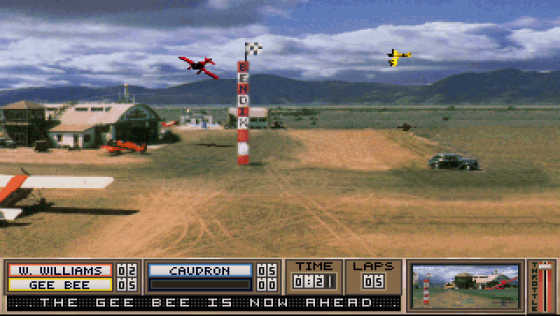
One thing's for sure, it's a damn sight more enjoyable than Costner's bizarre mid-Atlantic playing of the Hood legend. Most notable are its flying sequences, courtesy of George Lucas's special effects outfit Industrial Light & Magic, which are marvellously exhilarating to watch. Who knows? With its release on video due any time now it may start to win some of the public acclaim it rightfully deserves.
So with the film's poor public reception, the more cynical and bitter amongst the reviewing fraternity (i.e. me) might be forgiven - but not condoned - for expecting some slapdash piece of rubbish intended to cash in on the film's few fans. And these suspicions are heightened when you look at the screenshots on the back of the packaging. But you couldn't be more wrong. Sure, The Rocketeer's got some problems (Which I'll come to in a moment) but, as it turns out, it is one of the classiest film licences I've ever seen.
The most immediate gripe any discerning punter could have with the game is that its scenario is totally dissimilar to that of the film. The main characters and the main plot thrust - evil Nazis try to steal revolutionary rocket pack from hunky clean-cut American hero - are the same, but the details are completely different.
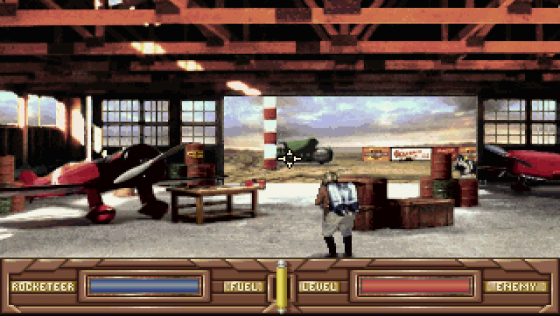
The movie was a moderately complicated yarn involving a Nazi agent posing as a Hollywood heartthrob, Mafia mobsters, the F.B.I. and even Howard Hughes. The game, on the other hand, is far simpler. The main deviation from the basic scenario described above is that, having failed to lay their hands on the rocket pack, the Nazis grab the hero's girlfriend and make off with her instead, entailing a long airborne chase and a bout of fisticuffs on the tail of a Zeppelin for the climax.
The game is split into five levels or, as they are called here, in keeping with the subject matter's pulp adventure inspirations. 'Episodes' encompassing a variety of gameplay styles - shoot-'em-up, beat-'em-up and so on. As the astute reader will have spotted, Disney have taken a dip in Ocean's Bumper Book Of How To Do The Game Of The Film. A hackneyed, cliched and uninspired approach to game design it may be but, as the likes of Robocop and Batman have shown in the past, as long as it's done well there's no reason why the final result can't be an excellent game.
But it's strange. Just when Ocean are making attempts to move away from the style of tie-in they used to churn out with the innovative lives of Hudson Hawk and Robocop 3, it appears Disney have appeared to pick up from where they left off.
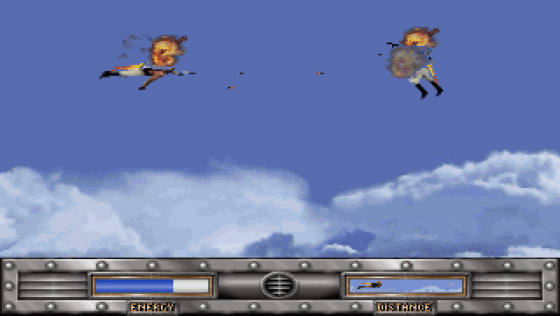
First impressions are excellent. Each episode is preceded by a series of comic-style screens detailing the plot's development. Like Sierra and Lucasfilm the graphics have been drawn and painted by a 'traditional' artist then digitised. The results are superb, and in keeping with The Rocketeer's true origins, but it's yet another distancing of the game from the film.
It's all very bizarre. First, the plot differences and now the use of comic artwork as opposed to digitised stills from the film. You begin to get the impression that the game designers wanted the links with the film to be as few as possible. If nothing else, I guess it avoids the hassles of negotiating the rights to use the various stars' likenesses in the game (a thorny problem that US Gold failed to surmount with its disappointing Godfather licence). Mind you, since Disney Software handled the game you wouldn't think there'd be a problem. Oh well.
The first episode opens in Bigelow's Air Circus where Cliff Secord, a dashing and youthful air jockey, is about to enter a potentially-lucrative air race competition. If Cliff can prove his aviatorial skills by winning two races in a row then his mechanic, mentor and eccentric inventor Ambrose 'Peevy' Peabody will let him take the amazing Cirrus X-3 rocket-pack for a trial run.
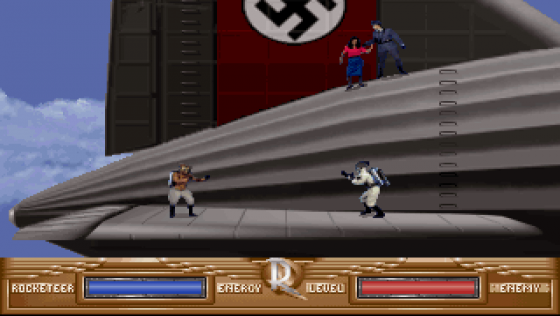
The player, as Cliff, has a choice of one of three planes for the big race, each with differing top speeds, accelerations and turning abilities. The player then has to be first to complete a given number of 'laps' around two red-chequered poles placed several hundred yards apart. Flight control is basic in the extreme - it's simply a matter of accelerating, decelerating, climbing or banking with any combination of the keyboard, mouse or joystick. The recipe for success is to cut as tight as you can into the inside of the lap without hitting the end poles, or your competitors.
The player has two views of the race, side-on and 3D. The side-on view takes up most of the screen, with the player's plane staying centre of the screen and the background scrolling to follow its progress around the course. The 3D view, set in the bottom right-hand corner of the status strip, is tiny.
Trouble is, while the side-on view is very pretty and provides a lot of entertainment for any spectators of your games-playing prowess, it makes the task of playing an already bloody difficult game virtually impossible because, despite some helpful ground shadows, it's tough working out where your plane is in relation to the course. The 3D view is far more useful, but it's a pain not because it's so small (size, after all, isn't important) but because you can see the visually far more exciting side-on action in your peripheral vision. If you imagine going to see a mega-blockbuster at the flicks and then being forced by a sadistic usherette to watch it on some titchy handheld TV then you'll get some idea of what I mean.
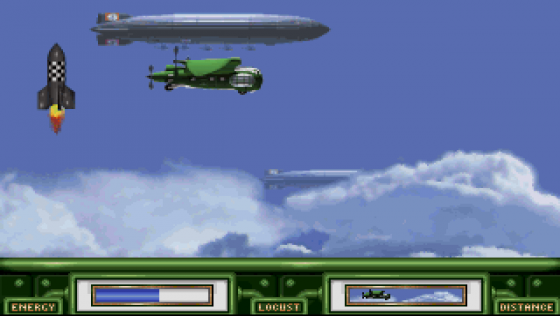
For the first game the air race is surprisingly difficult (perhaps a little too much so) though great fun. The only rear gripe is that it would have been better to inject a little more variety by making the planes fly something more complex than an oval - a figure of eight, say. Also, when the player finally gets to try out the rocket pack, it comes as a bit of a disappointment to discover that it handles identically to the planes, but faster.
Into the second episode and the foul Nazis make their attempt to grab the rocket pack. Quite why they're so keen to get their hands on it is never made clear, because it's made obvious in this and later episodes is that the Nazis already possess their own rocket pack technology. Must be after that superior Yankie know-how that only comes from being able to lead a life free from oppression in a God-fearing democratic society. Or something.
It's basically Operation Wolf - or more accurately Cabal - in an aircraft hangar. Nazi commandos pop up from behind workbenches, aircraft and oil cans while others fly in through the hangar doors to take pot-shots at the Rocketeer who stalks the floor area to the front of the screen. The player can move a sight around the screen to zap the baddies as they appear. If the sight nears the edge of the screen, the Rocketeer walks left or right and the screen scrolls to follow him. Energy bars for the Rocketeer and the Nazis slowly shrink at the bottom of the screen. The player has to finish off the villainous Nazis before they do the same to him.
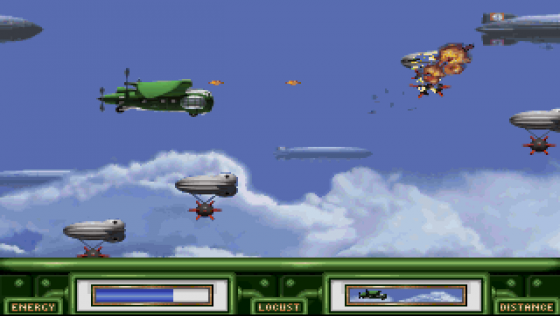
Operation Wolf clones are a staple ingredient of these multi-section style games, but The Rocketeer's take on it is better than most. It's all good, violent fun and the realistically digitised figures make the action far more involving than it might otherwise be. The scrolling, though super smooth for a PC, can be a bit hard on the eyes sometimes as it rocks back and forth to follow the player's darting sight.
At the end of the second episode, the Nazis, realising they are no match for Cliff's marksmanship, kidnap Peevy and - horror! - the luscious Jenny Blake, Cliff's girly, and try to make good their escape in a commandeered US experimental plane, the odd-looking Locust. Firing up the rocket pack Cliff takes to the sky - a sky filled with more squadrons of Nazi commandos!
Yes, episode three is a horizontally-scrolling shoot-'em-up, but a pretty good one. The player has to shoot or dodge all manner of Nazi fiends, some zooming in wearing rockets, others gliding down on parachutes. If that wasn't enough, there are frequent deadly storms of bombs that rain down and V2 rockets that blast in, homing on the Rocketeer. Interestingly, more deadly than the standard enemies is the tumbling burning wreckage left behind when shot. Small red balloons award the player three-way fire, but the effects last for such a short time it's worth the bother or risk of trying to collect them.
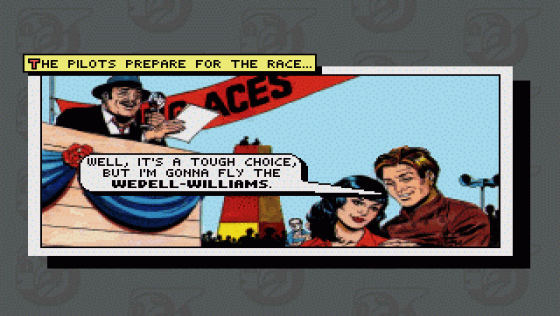
Episode four and, having caught up with the Locust just as his pack runs out of fuel, Cliff learns from a dazed Peevy that Jenny is in fact further ahead, held captive aboard a giant hydrogen-filled Zeppelin. Taking hold of the Locust's control Cliff heads off into the wide blue yonder once more. It's more shoot-'em-up action, but much, much harder. This time the player is beset by strange German VTOL craft, balloon-mounted bombs, V1 rockets that fire up from the bottom of the screen in a most unexpected way and not a glimmer of a power-up in sight. To be honest with you, I could have done without having another shoot-'em-up straight after the first - oooh, my aching trigger finger!
At last Cliff catches up with the Nazi blimp. Leaving Peevy to fly the Locust back to base, Cliff tumbles down onto the Zeppelin's tail to rescue Jenny. But the Nazis have seen him coming and have prepared a little... reception for him. Now only one beefy Bierwurst muncher with fists like coconuts stands between Cliff, his beloved Jenny and the downfall of the Third Reich. Maybe.
Even by beat-'em-up standards, which are not renowned for their complexity, this, the fifth and final episode in The Rocketeer saga, is basic to say the least. The player can move Cliff left or right along the Zeppelin tail fin and make him duck or punch. The trick is to duff the Nazi over before he forces you off the tail to your doom. It's a long way down.
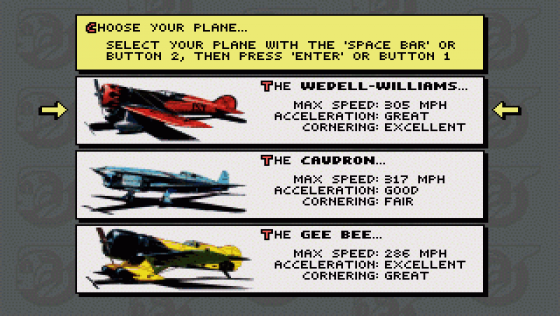
There's no denying that The Rocketeer is a quality product. The programmers have pulled out all the stops to make sure it looks and sounds superb. The scrolling is nothing short of a miracle for the PC, the animation is brilliant (Hey! This is Disney after all!) and the tunes and effects are suitably pacy and atmospheric (especially if you're got one of Disney's Sound Source devices - see the Mmmmmm... Sounds Saucy box (below) for more).
So, nothing to fault in the aesthetics. My real problems lay in the gameplay. While all the mini-games are great fun and very playable, there's a serious lack of any strong challenge - I got past episodes two and three on my second attempts. The password system doesn't help things either. I can't see anyone who is even halfway decent at arcade games taking more than a couple of days to finish the game. Perhaps this is not so much of a problem for the less arcade-orientated PC market, but potential Amiga or ST buyers should beware.
(Niggle: There's no password to the last episode, forcing you to play episode four just to get to the beat-'em-up. This is unfair. If you're going to have a password system then have a full one. This is just a lazy way of making the game harder to finish!)
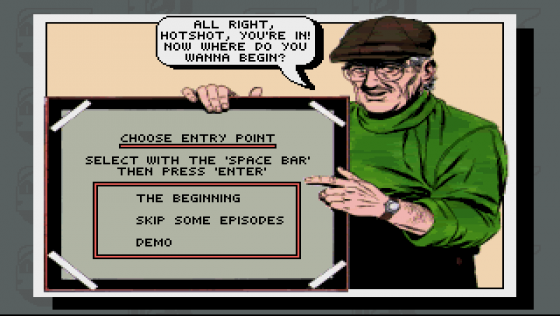
This easiness would perhaps not be so bad if there were more than just five levels, perhaps repeat but harder appearances of the second or fifth episodes, for example. As the developers have decided to completely ignore the film's plot anyway, it wouldn't have been to hard to write a scenario that involved more of these sections. As it stands, you can't help feeling more than a little short-changed.
Mmmmm... Sounds Saucy!
Yes! It's true! For the paltry sum of $39.95 (UK price to be confirmed) you can play the film *in your very own home*!
Well, not quite. The Sound Source, a wedge of cream plastic slab the size of a large hardback novel, won't turn your PC into some amazing multimedia device. But it does give you some of the best speech and FX ever.
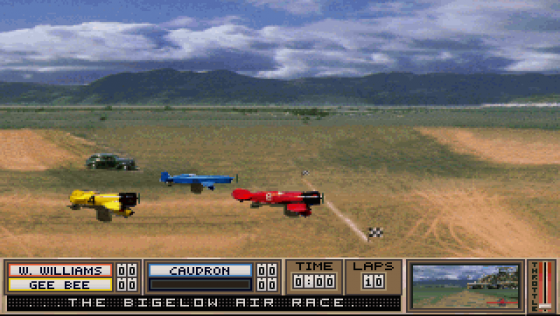
And it adds incredibly to the enjoyment of The Rocketeer. Instead of having to read the speech bubbles that come up in the cartoon intros, you can sit back and have them read out to you by actors performing the roles of the various characters.
It's particularly effective on the plane choosing menu where, as you cycle through the choices, Cliff's pondersome voice murmurs "Mmmmm, the Gee Bee's slow but it's great for taking corners..." and such like.
There is a drawback - the samples slows the game dramatically. Fine on the big boys, but 8MHzers will not be impressed by the frequent thrice per second screen update.
PC Version
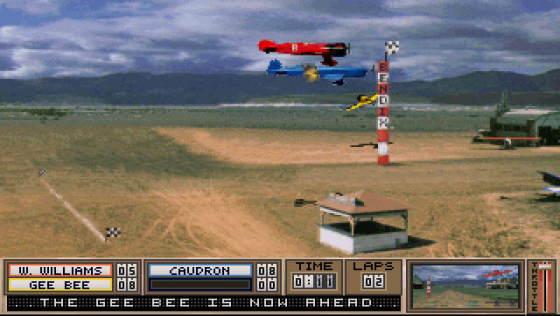
No complaints on the sound or graphics fronts: the tunes and effects are great (especially with a Sound Source device) and the digitised/hand-drawn graphics are even better - the smooth scrolling has to be seen to be believed!
Although a hard disc is, as ever, recommended, the game is perfectly playable from floppy. The only fly(boy) in the ointment is that you really need a 16MHz and up machine to reap maximum enjoyment from the game.
Amiga Version
The Amiga version won't be quite as pretty as the PC's 256-colour one, but with Disney at the helm expect something fairly snazzy. In terms of gameplay there's nothing here that the Amiga couldn't handle with its blitter tied behind its back.
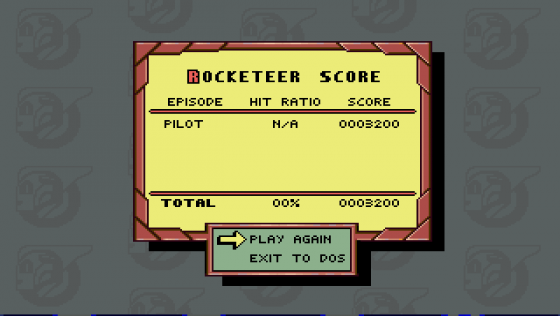
While The Rocketeer's simplicity and ease is acceptable for the largely arcade-naive PC owner, the hardened Amiga gamer may find the going just a bit too easy. The Rocketeer should be coming in for landing in May.
ST Version
While there's no way that the ST version could look as good as the PC one, there's no reason why it shouldn't play identically. And there lies the problem - unless Disney beef up the gameplay (unlikely) then players who have cut their gaming teeth on the current crop of state-of-the-art ST title are likely to find The Rocketeer something of a breeze to complete. Look out for an update in the Reviews Directory around about May.
Uppers
- Arcade-quality game graphics with super-smooth scrolling - on a PC!
- Inspired cartoon-style presentation generates a strong 1930s atmosphere.
- Action-packed bag of varied game styles maintain player addiction.
Downers
- Characters aside, it's nothing to do with The Rocketeer film.
- Games are too simple and easy to complete, making for poor Value For Money.
- More buzzing about in the rocket pack would have been nice.
Verdict
Right from take off The Rocketeer impresses: the first episode looks and sounds marvellous and plays well too (as do the rest for that matter). If only it wasn't so hard to win!
Some hair-tearing later and the skilled player should discover that the episode is actually a breeze to complete - if you know the secret.
The subsequent episodes are easier. A lot easier. Too easy, in fact. And chances are that it will only take the typical player a few days or so of concentrated play to rescue Jenny. Still, while it lasts, The Rocketeer is a great-looking joy and comes recommended to all those poor PC owners starved of out-and-out slambang arcade action.

